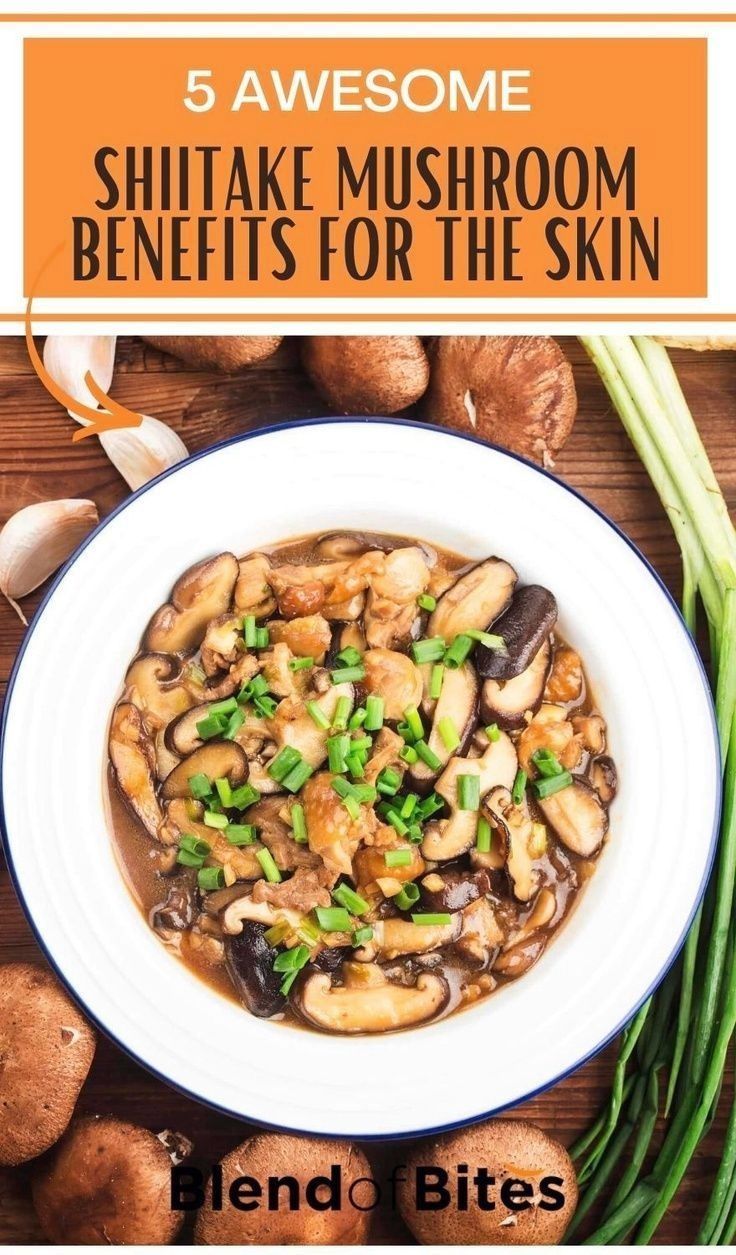Eat Your Way to Wellness: The Top 5 Health Perks of Shiitake – A Fungal Odyssey to Optimal Health
In the annals of natural medicine and culinary delight, few ingredients command the reverence and scientific fascination quite like the shiitake mushroom. Its very name, derived from the Japanese shii (referring to the Castanopsis cuspidata tree on which it traditionally grows) and take (mushroom), whispers of ancient forests, hidden wisdom, and a profound connection to the earth. For millennia, this unassuming fungus has not merely graced the plates of emperors and peasants alike but has also served as a cornerstone of traditional Eastern medicine, revered for its life-enhancing properties.
Imagine a time when wellness was not a multi-billion-dollar industry but an intuitive pursuit, guided by observation and passed down through generations. In this era, the shiitake emerged as a silent sentinel of health, its subtle umami flavor a delightful bonus to its powerful medicinal gifts. Its journey from the decaying logs of Asian forests to the bustling markets and sophisticated laboratories of the modern world is a testament to its enduring power – a power that we are now, more than ever, beginning to fully understand through the lens of contemporary science.
This is the story of the shiitake, not just as a culinary marvel, but as a potent ally in our quest for optimal health. It’s a narrative of nature’s intricate chemistry, of compounds working in symphony to fortify our bodies, protect our cells, and enhance our vitality. We invite you to embark on a fungal odyssey, to uncover the profound ways in which this humble mushroom empowers us to truly "eat our way to wellness." Beyond its rich, earthy taste lies a treasure trove of benefits, and today, we will delve into the top five health perks that elevate the shiitake from a mere ingredient to a veritable superfood.
The Shiitake Saga: From Ancient Lore to Modern Science
The history of the shiitake mushroom (Lentinula edodes) is as rich and complex as its flavor profile. Its cultivation dates back over a thousand years, with the earliest written records appearing in China during the Song Dynasty (960–1279 AD). However, archaeological evidence suggests its use may stretch back even further, making it one of the oldest cultivated mushrooms in the world. Legend tells of its discovery by Buddhist monks, who observed its growth on decaying hardwood logs and, through keen observation, recognized its unique properties.
In ancient China and Japan, shiitake was more than just food; it was a symbol of longevity and vitality. Texts from the Ming Dynasty physician Wu Juei, in his seminal work "Botanical Compendium," describe shiitake as a remedy for colds, poor circulation, liver ailments, and as a booster of "qi" – the vital life force. It was often reserved for royalty and nobility, a prized commodity believed to bestow strength and prevent disease. The methods of its cultivation, initially rudimentary and reliant on natural inoculation, gradually evolved, becoming more sophisticated as its demand grew. Farmers would carefully select logs, make incisions, and wait for the spores to take hold, a process that could take months but yielded precious harvests.
As centuries passed, shiitake’s reputation spread across Asia. It became an integral part of traditional Chinese medicine (TCM) and Japanese Kampo medicine, where it was prescribed for a wide array of conditions, from enhancing immune function to combating various forms of cancer. Its distinct umami flavor, first identified by Japanese chemist Kikunae Ikeda in 1908, further cemented its place in global cuisine. This savory "fifth taste," distinct from sweet, sour, salty, and bitter, is largely attributed to the presence of guanosine monophosphate in shiitake, making it a culinary star capable of deepening the flavor of almost any dish.
The shiitake’s journey to Western recognition began more recently, gaining significant traction in the latter half of the 20th century. What started as an exotic ingredient found only in specialty Asian markets has transformed into a staple in supermarkets worldwide. More importantly, its traditional medicinal claims began to attract the scrutiny of Western science. Researchers, intrigued by its long history of therapeutic use, started to isolate its bioactive compounds and investigate their mechanisms of action. This scientific inquiry has not only validated many of the ancient beliefs but has also unveiled new, astonishing benefits, cementing shiitake’s status as a formidable functional food in the modern era.
Unpacking Shiitake’s Bioactive Arsenal: The Chemistry of Wellness
Before we dive into the specific health perks, it’s crucial to understand why shiitake is so potent. Its remarkable therapeutic properties stem from a complex symphony of bioactive compounds, each playing a vital role in the mushroom’s overall health-promoting effects. It’s not a single "magic bullet" but rather a sophisticated biochemical toolkit that nature has perfected over millennia.
At the heart of shiitake’s immune-boosting prowess lies Lentinan, a beta-glucan polysaccharide. Beta-glucans are complex carbohydrates found in the cell walls of fungi, oats, barley, and yeast. Lentinan, specifically, has been extensively studied for its immunomodulatory and potential anti-cancer properties. It doesn’t directly kill pathogens or cancer cells but rather stimulates the host’s immune system, empowering it to fight more effectively.
Another unique compound is Eritadenine, an amino acid derivative. Eritadenine has garnered attention for its profound impact on lipid metabolism, particularly its ability to help regulate cholesterol levels.
Shiitake is also a rich source of Ergothioneine, a potent amino acid with unparalleled antioxidant capabilities. Unlike many other antioxidants, ergothioneine has a specific transporter in the human body, allowing it to accumulate in tissues that are prone to high oxidative stress, such as the liver, kidneys, and red blood cells. This suggests a highly specialized role in cellular protection.
Beyond these specific compounds, shiitake mushrooms are packed with an array of other beneficial nutrients:
- B Vitamins: Riboflavin (B2), Niacin (B3), Pantothenic Acid (B5), Vitamin B6, and Folate – crucial for energy metabolism, nerve function, and cell health.
- Minerals: Copper (essential for iron metabolism and red blood cell formation), Selenium (a powerful antioxidant and immune booster), Zinc (vital for immune function, wound healing, and DNA synthesis), and Manganese (an enzyme cofactor).
- Dietary Fiber: Both soluble and insoluble, supporting digestive health and promoting satiety.
- Polysaccharides: Beyond Lentinan, other polysaccharides contribute to immune support and overall cellular health.
- Vitamin D: Uniquely, shiitake mushrooms contain ergosterol, a precursor to Vitamin D2. When exposed to ultraviolet (UV) light (either from the sun or specialized lamps), ergosterol is converted into Vitamin D2, making shiitake a rare plant-based source of this crucial vitamin.
This diverse array of compounds works synergistically, creating a holistic effect that is greater than the sum of its parts. It is this biochemical complexity that underpins the following top five health perks, making shiitake a truly extraordinary food for wellness.
Perk 1: Immune System Fortification – The Shield of Lentinan
Imagine your immune system as a sophisticated fortress, constantly vigilant against invaders, its walls manned by specialized guards and its armory stocked with potent defenses. In this analogy, the shiitake mushroom, with its remarkable compound Lentinan, acts as the master architect and strategic commander, fortifying the defenses and sharpening the response of your body’s immune army. This is arguably shiitake’s most celebrated and well-researched health benefit.
At the core of this fortification is Lentinan, a beta-glucan polysaccharide. Unlike simple sugars, beta-glucans are complex carbohydrate structures that are not digested by human enzymes in the upper gastrointestinal tract. Instead, they travel to the intestines where they interact with specialized immune receptors on cells like macrophages and dendritic cells. This interaction is akin to a key fitting into a lock, triggering a cascade of immune responses.
Lentinan doesn’t directly kill pathogens; rather, it’s an immunomodulator. This means it fine-tunes and enhances the body’s own immune system, making it more efficient and robust. It stimulates the production and activity of various immune cells, including:
- Macrophages: These "big eaters" engulf and digest cellular debris, foreign substances, microbes, and cancer cells. Lentinan increases their phagocytic activity.
- Natural Killer (NK) Cells: These lymphocytes are crucial for recognizing and destroying virus-infected cells and tumor cells without prior sensitization. Lentinan enhances their cytotoxic capabilities.
- T-lymphocytes (T-cells): These are central to cell-mediated immunity, identifying and targeting specific pathogens or abnormal cells. Lentinan can promote their proliferation and activation.
- Cytokines: These are signaling molecules that mediate and regulate immunity and inflammation. Lentinan can modulate the release of various cytokines, orchestrating a more effective immune response.
The practical implications of this immune enhancement are significant. Regular consumption of shiitake has been linked to a reduced incidence and severity of common infections, such as colds and flu. Studies have shown that shiitake can improve the immune cell functionality of individuals, leading to better defenses against pathogens. For instance, a notable study published in the Journal of the American College of Nutrition demonstrated that daily shiitake consumption improved immunity, reduced inflammation, and improved gut immunity in healthy adults. Participants showed improved gamma delta T-cell proliferation and NK cell activity, key markers of robust immune function.
Beyond everyday infections, Lentinan’s immunomodulatory effects have garnered considerable attention in the realm of oncology. While it’s crucial to state that shiitake or Lentinan are not a cure for cancer, research, particularly in Asian countries, has explored its role as an adjunctive therapy. Administered alongside conventional cancer treatments (like chemotherapy and radiation), Lentinan has been shown in some studies to improve patient quality of life, prolong survival, and reduce the side effects of conventional treatments by bolstering the immune system during these challenging times. It helps the body mount a stronger defense against cancer cells and recover more effectively from the rigors of treatment.
In essence, shiitake provides the blueprint and the resources for your immune system to build a stronger, more responsive shield. It’s a proactive approach to health, empowering your body’s innate ability to protect itself from a myriad of threats, both common and complex.
Perk 2: Cardiovascular Health – The Heart’s Silent Guardian
Envision your cardiovascular system as a complex network of highways, with your heart acting as the tireless engine, pumping life-sustaining blood to every corner of your body. For this intricate system to function optimally, the "highways" (blood vessels) must remain clear, flexible, and free from obstructions, and the "engine" (heart) must operate under stable conditions. The shiitake mushroom steps in as a silent, diligent guardian, offering a multifaceted approach to maintaining and enhancing cardiovascular wellness.
Shiitake’s contribution to heart health is primarily attributed to its unique compounds, particularly Eritadenine, alongside its rich fiber content and antioxidant profile.
1. Cholesterol Management via Eritadenine:
Eritadenine is a fascinating amino acid derivative found specifically in shiitake. Research has shown that Eritadenine has a remarkable ability to influence cholesterol metabolism. It works by inhibiting the activity of an enzyme called HMG-CoA reductase, which is a key player in the liver’s production of cholesterol. By dampening this enzyme, Eritadenine can help reduce the synthesis of endogenous cholesterol. Furthermore, studies suggest that Eritadenine may also promote the excretion of cholesterol from the body. This dual action contributes to a reduction in harmful low-density lipoprotein (LDL) cholesterol, often referred to as "bad" cholesterol, which is a major risk factor for atherosclerosis (hardening of the arteries) and heart disease.
Beyond Eritadenine, the dietary fiber in shiitake also plays a crucial role. Soluble fiber binds with cholesterol in the digestive tract, preventing its absorption and facilitating its excretion. This additive effect amplifies shiitake’s cholesterol-lowering potential.
2. Blood Pressure Regulation:
While not as extensively studied as its cholesterol-lowering effects, some research suggests that shiitake may contribute to healthy blood pressure levels. Its rich content of potassium, a mineral known to counteract the effects of sodium, can help regulate fluid balance and reduce pressure on blood vessel walls. Additionally, the anti-inflammatory and antioxidant properties of shiitake can improve endothelial function – the health of the inner lining of blood vessels – promoting better vasodilation and reducing overall vascular resistance.
3. Antioxidant Protection for Vascular Health:
The cardiovascular system is particularly vulnerable to oxidative stress, which can damage blood vessel walls and contribute to plaque formation. Shiitake’s robust antioxidant profile, including Ergothioneine, selenium, and various polyphenols, provides critical protection. These antioxidants neutralize free radicals, reducing oxidative damage to lipids in the blood (preventing LDL oxidation, a key step in atherosclerosis) and safeguarding the integrity of blood vessels. A healthy, undamaged endothelium is less prone to inflammation and plaque buildup, ensuring smooth blood flow.
4. Anti-inflammatory Effects:
Chronic low-grade inflammation is now recognized as a significant contributor to heart disease. The bioactive compounds in shiitake, including certain polysaccharides and triterpenoids, possess anti-inflammatory properties. By mitigating systemic inflammation, shiitake helps protect the heart and blood vessels from long-term damage that can lead to cardiovascular events.
In essence, incorporating shiitake into your diet is like enlisting a silent guardian for your heart. It helps to keep your circulatory pathways clear, your blood pressure balanced, and your vital cardiovascular tissues protected from internal wear and tear, contributing significantly to a longer, healthier life for your most essential organ.
Perk 3: Potent Antioxidant Power – Battling the Oxidative Storm
Imagine your body as a magnificent, complex machine, constantly performing countless metabolic processes. A natural byproduct of these processes, and exposure to environmental factors like pollution and UV radiation, is the generation of highly reactive molecules called free radicals. These unstable molecules, lacking a full complement of electrons, frantically try to steal electrons from stable molecules in your cells, causing damage – a phenomenon known as oxidative stress. Over time, unchecked oxidative stress can be likened to a relentless storm, eroding cellular integrity and paving the way for chronic diseases, accelerated aging, and general cellular dysfunction.
Here, the shiitake mushroom emerges as a heroic defender, armed with an arsenal of potent antioxidants that stand guard against this internal storm. While many foods boast antioxidant properties, shiitake contains a particularly remarkable compound: Ergothioneine.
Ergothioneine: The Master Antioxidant
Ergothioneine (L-ergothioneine, or EGT) is a unique sulfur-containing amino acid that mushrooms, including shiitake, are exceptional sources of. What makes EGT truly stand out is its specialized role in human biology. Unlike many other antioxidants, EGT has a dedicated transporter protein (OCTN1) in human cells, allowing it to be actively absorbed and accumulated in specific tissues and organs that are highly susceptible to oxidative stress, such as the liver, kidneys, red blood cells, bone marrow, and even the eyes and brain. This suggests that the body recognizes EGT as uniquely important and prioritizes its uptake and retention.
Once inside the cells, EGT performs several critical functions:
- Direct Free Radical Scavenging: It directly neutralizes a wide range of free radicals, including reactive oxygen species (ROS) and reactive nitrogen species (RNS), preventing them from damaging cellular components like DNA, proteins, and lipids.
- Mitochondrial Protection: Mitochondria, the "powerhouses" of our cells, are major sites of free radical production. EGT concentrates in mitochondria, protecting them from oxidative damage and ensuring efficient energy production.
- Heavy Metal Chelation: EGT can bind to certain toxic heavy metals, reducing their ability to catalyze harmful oxidative reactions.
- Enzyme Protection: It helps protect critical enzymes from oxidative inactivation, maintaining cellular function.
The presence of EGT in shiitake, often in significantly higher concentrations than in many other foods, makes it an extraordinary dietary source of this "longevity vitamin," as some scientists have dubbed it. Its ability to persist in the body for longer periods compared to other antioxidants further amplifies its protective effects.
Beyond Ergothioneine: A Symphony of Antioxidants
While EGT is a star player, shiitake’s antioxidant power isn’t a solo act. It also provides:
- Selenium: An essential trace mineral and a component of several antioxidant enzymes, such as glutathione peroxidase, which plays a critical role in detoxifying harmful peroxides in the body.
- Copper: Another trace mineral that acts as a cofactor for superoxide dismutase (SOD), one of the body’s primary endogenous antioxidant enzymes.
- Polyphenols and Flavonoids: These plant compounds are well-known for their antioxidant and anti-inflammatory properties, further contributing to shiitake’s protective shield.
- Vitamin C (Ascorbic Acid): While not its primary claim to fame, shiitake contains some Vitamin C, which is a powerful water-soluble antioxidant.
The cumulative effect of these antioxidants is profound. By neutralizing free radicals and reducing oxidative stress, shiitake helps to:
- Reduce the Risk of Chronic Diseases: Oxidative stress is implicated in the development and progression of numerous chronic conditions, including cardiovascular disease, neurodegenerative disorders (like Alzheimer’s and Parkinson’s), certain cancers, and diabetes.
- Combat Inflammation: Oxidative stress and inflammation are closely linked; reducing one often helps to mitigate the other.
- Support Anti-Aging: By protecting cells from damage, antioxidants help preserve cellular function and integrity, potentially slowing down the cellular aging process and maintaining youthful vitality.
- Enhance Skin Health: Protecting skin cells from environmental damage and supporting collagen integrity.
Incorporating shiitake into your diet is akin to providing your body with a sophisticated defense system against the invisible forces that threaten cellular health. It’s an investment in longevity, vitality, and resilience against the wear and tear of daily life.
Perk 4: Bone Health and Mineral Richness – Building a Strong Foundation
Imagine your skeletal system as the sturdy, intricate framework of a magnificent building, providing support, protection, and mobility. For this framework to remain strong and resilient throughout your life, it requires a continuous supply of essential building blocks and the right conditions for their incorporation. The shiitake mushroom, often overlooked for its skeletal contributions, is a surprisingly potent ally in building and maintaining robust bone health, particularly through its unique capacity for Vitamin D synthesis and its rich mineral profile.
1. The Sunshine Vitamin D Connection:
Perhaps one of the most exciting and underappreciated aspects of shiitake is its ability to produce Vitamin D2 (ergocalciferol). Mushrooms naturally contain ergosterol, a precursor to Vitamin D. When exposed to ultraviolet (UV) light – either from the sun or specialized UV lamps – this ergosterol is converted into Vitamin D2, much like human skin converts cholesterol into Vitamin D3 when exposed to sunlight.
This makes sun-dried or UV-treated shiitake an exceptional plant-based source of Vitamin D, a vitamin notoriously scarce in the plant kingdom. Why is Vitamin D so crucial for bone health?
- Calcium Absorption: Vitamin D is absolutely essential for the absorption of calcium from the gut into the bloodstream. Without adequate Vitamin D, even a calcium-rich diet won’t effectively contribute to bone density.
- Bone Mineralization: It plays a vital role in regulating calcium and phosphate levels in the body, which are critical for the proper mineralization of bones and teeth.
- Bone Remodeling: Vitamin D also influences bone remodeling, the continuous process of old bone tissue removal and new bone tissue formation, ensuring bone strength and integrity.
Vitamin D deficiency is widespread globally and is a significant risk factor for osteoporosis (brittle bones), osteomalacia (softening of bones), and increased fracture risk. For vegetarians, vegans, or those with limited sun exposure, shiitake offers a delicious and natural way to boost Vitamin D intake and support skeletal health. Simply placing fresh shiitake mushrooms gill-side up in direct sunlight for an hour or two before cooking can dramatically increase their Vitamin D content.
2. A Symphony of Bone-Supporting Minerals:
Beyond Vitamin D, shiitake mushrooms are a treasure trove of essential trace minerals that play direct and indirect roles in bone formation and maintenance:
- Copper: This vital trace mineral is a cofactor for lysyl oxidase, an enzyme involved in cross-linking collagen and elastin, which are critical structural components of bone matrix. Copper deficiency can impair bone density and strength.
- Selenium: While primarily known for its antioxidant and immune-boosting properties, selenium also plays a role in bone metabolism. It’s involved in various enzymatic processes that contribute to bone health and may help protect bone cells from oxidative damage.
- Zinc: Essential for bone formation and mineralization, zinc is a cofactor for alkaline phosphatase, an enzyme crucial for bone development. It also plays a role in osteoblast (bone-building cells) activity and collagen synthesis.
- Manganese: Another essential trace mineral, manganese is involved in the formation of bone cartilage and connective tissue. It is a component of enzymes that synthesize proteoglycans, vital for bone and joint health.
These minerals work in concert with Vitamin D and calcium (which shiitake also contains in modest amounts) to ensure the proper development, density, and strength of your bones. They support the complex biochemical processes involved in bone remodeling, helping to prevent bone loss as we age and reducing the risk of conditions like osteoporosis.
By incorporating shiitake into your diet, especially sun-exposed varieties, you’re not just adding flavor; you’re providing your skeletal system with a powerful cocktail of essential nutrients, building a resilient foundation for a lifetime of mobility and strength. It’s a proactive step towards safeguarding your future bone health, ensuring that your body’s framework remains robust and capable.
Perk 5: Digestive Wellness and Gut Microbiome Support – The Inner Garden
Consider your gut as a bustling, intricate inner garden, a delicate ecosystem teeming with billions of microorganisms – your gut microbiome. This microbiome is not merely responsible for digestion; it profoundly influences your immune system, mood, metabolism, and overall health. A flourishing, diverse gut garden is foundational to wellness. The shiitake mushroom, with its rich dietary fiber and unique polysaccharide profile, acts as a wise and nurturing gardener, fostering a healthy environment for your beneficial gut flora.
Shiitake’s contributions to digestive wellness are primarily centered around its significant fiber content and its potential as a prebiotic.
1. Dietary Fiber: The Foundation of Gut Health:
Shiitake mushrooms are an excellent source of dietary fiber, containing both soluble and insoluble types.
- Insoluble Fiber: This type of fiber adds bulk to stool, facilitating regular bowel movements and preventing constipation. It acts like a "broom," sweeping waste through the digestive tract and promoting intestinal regularity.
- Soluble Fiber: This fiber forms a gel-like substance in water, which can help slow down digestion, contributing to feelings of fullness and aiding in blood sugar regulation. More importantly for gut health, soluble fiber is fermentable.
2. Prebiotic Power: Nourishing Your Gut Microbiome:
The fermentable fibers and complex polysaccharides in shiitake, including beta-glucans like Lentinan (though Lentinan’s primary role is immune modulation, other polysaccharides contribute), act as prebiotics. Prebiotics are non-digestible food components that selectively stimulate the growth and activity of beneficial bacteria (probiotics) in the colon.
When these beneficial gut bacteria (such as Bifidobacterium and Lactobacillus species) ferment the prebiotic fibers from shiitake, they produce short-chain fatty acids (SCFAs), particularly butyrate, acetate, and propionate. These SCFAs are incredibly important for gut health and beyond:
- Butyrate: This is the preferred fuel source for the cells lining the colon (colonocytes). It helps maintain the integrity of the gut barrier, preventing "leaky gut," and has potent anti-inflammatory effects within the gut. A healthy gut barrier is crucial for preventing toxins and undigested food particles from entering the bloodstream.
- Anti-inflammatory Effects: SCFAs, particularly butyrate, contribute to a reduction in gut inflammation, which is important for preventing and managing inflammatory bowel diseases (IBD) and irritable bowel syndrome (IBS).
- Enhanced Nutrient Absorption: A healthy microbiome can improve the absorption of certain vitamins and minerals.
- Immune System Modulation: A significant portion of our immune system resides in the gut. A balanced microbiome, fostered by prebiotics, contributes to a robust and well-regulated immune response.
- Gut-Brain Axis: Emerging research highlights the profound connection between the gut microbiome and brain health, influencing mood, cognitive function, and even anxiety. By nurturing a healthy gut, shiitake indirectly supports mental well-being.
3. Anti-inflammatory Gut Effects:
Beyond the prebiotic effect, some compounds in shiitake may directly exert anti-inflammatory effects on the gut lining, helping to soothe irritation and promote healing. This can be particularly beneficial for individuals experiencing digestive discomfort or inflammatory conditions.
By regularly incorporating shiitake into your diet, you are actively feeding and nurturing your inner garden. You are providing the essential fuel for your beneficial gut bacteria, allowing them to flourish and perform their myriad health-supporting functions. This translates to improved digestion, reduced bloating, enhanced nutrient absorption, and a stronger foundation for overall health, starting from within. It’s a delicious way to cultivate a thriving internal ecosystem and experience the profound benefits of a happy gut.
Beyond the Top 5: A Glimpse at Other Potential Benefits
While the top five perks highlight shiitake’s most significant contributions to wellness, the mushroom’s intricate biochemical profile offers a spectrum of other potential health advantages, underscoring its holistic power.
Weight Management Support: The fiber content in shiitake promotes satiety, helping you feel fuller for longer and potentially reducing overall calorie intake. Furthermore, some research suggests that certain compounds in shiitake may influence lipid metabolism and help prevent excessive fat accumulation, supporting healthy weight management.
Blood Sugar Regulation: Shiitake’s soluble fiber can help slow the absorption of glucose into the bloodstream, contributing to more stable blood sugar levels. Early studies also hint at other compounds potentially improving insulin sensitivity, making it a valuable addition for those managing or at risk of type 2 diabetes.
Skin Health and Anti-Aging: The potent antioxidant profile, particularly Ergothioneine, helps protect skin cells from oxidative damage caused by UV radiation and environmental pollutants, which are major contributors to premature aging, wrinkles, and hyperpigmentation. Its anti-inflammatory properties can also help soothe skin conditions and promote a healthy complexion.
Cognitive Function: Ergothioneine’s ability to cross the blood-brain barrier and accumulate in the brain suggests a protective role against neurodegenerative diseases. By safeguarding neuronal cells from oxidative stress and inflammation, shiitake may support long-term cognitive health, memory, and overall brain function. The B vitamins also play crucial roles in nerve health and neurotransmitter synthesis.
Anti-Cancer Potential (Adjunctive): While discussed under immune support, it’s worth reiterating the significant research into Lentinan’s direct and indirect anti-cancer properties. It not only boosts the immune system to fight cancer cells but also shows promise in inhibiting tumor growth, angiogenesis (formation of new blood vessels that feed tumors), and inducing apoptosis (programmed cell death) in various cancer cell lines. Again, this is primarily explored as an adjunctive therapy alongside conventional treatments.
These additional benefits further solidify shiitake’s reputation as a comprehensive wellness food, touching upon almost every major system in the body.
Integrating Shiitake into Your Life: Culinary Wisdom and Practical Tips
The beauty of shiitake is that its health benefits are delivered in a package that is both profoundly delicious and incredibly versatile. Integrating this mushroom into your daily diet is a delightful journey of culinary exploration.
Forms of Shiitake:
- Fresh: Widely available, with a firm texture and mild flavor. Best used within a few days.
- Dried: The most common form, often preferred for its intensified umami flavor. Rehydrate by soaking in warm water for 20-30 minutes (reserve the soaking liquid – it’s liquid gold for soups and sauces!). Dried shiitake can be stored for months.
- Powdered: Made from dried mushrooms, this is a convenient way to add umami and nutrients to smoothies, spice rubs, or sauces without visible mushroom pieces.
- Extracts/Supplements: For targeted therapeutic use, concentrated extracts are available, standardized for compounds like Lentinan. Consult a healthcare professional before using these.
Culinary Applications:
Shiitake’s rich, earthy, and meaty flavor makes it a star in countless dishes:
- Soups and Broths: Essential for miso soup, ramen, pho, and any hearty vegetable or meat broth.






